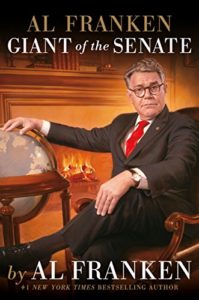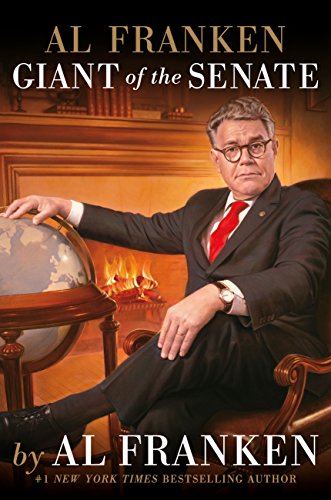
If you’re expecting nonstop laughs from Al Franken’s memoir, Al Franken, Giant of the Senate, you’ll be disappointed. Naturally, the book is laced with Franken’s signature humor. He rarely passes up an opportunity to go for a laugh. That even begins with the tongue-in-cheek title. But what comes through most strongly in this book is the man’s intelligence. If you’ve had the opportunity to talk to Al Franken, hear him speak about government policy or politics, or witness him in action on C-SPAN, you know what I’m talking about.
Learning how not to be funny
As Franken explains in his Foreword, this book is “the story of a midwestern Jewish boy of humble roots (the first in his family to own a pasta maker) who, after a thirty-five-year career in comedy, moved back home to challenge an incumbent senator. . . It’s the story of how, after spending a lifetime learning how to be funny, I learned how not to be funny.” Franken might have added that he also learned to keep his volcanic temper in check (at least most of the time).
Al Franken, Giant of the Senate by Al Franken (2017) 405 pages ★★★★★
Although it’s clear that Franken had a lifetime interest in politics, his entry into the arena was inspired by an extraordinary role model, Senator Paul Wellstone, who held the same seat in the U.S. Senate from 1991 until his tragic death in 2002. Like everyone else among Paul’s legion of supporters, Franken was shattered by the senator’s untimely death in a small plane that crashed in a snowstorm in northern Minnesota. (His wife, daughter, and two cherished long-time staff members died as well.)
The longest vote recount ever?
After a savage election campaign in which his integrity was repeatedly impugned and lines in jokes he’d told as a comedian were pulled out of context again and again to make him look evil, Franken eked out a victory in one of the closest elections in the history of the U.S. Senate. Republicans dragged out the recount process for eight months to keep Franken from providing Democrats with the 60th vote in the Senate that would enable them to prevent a filibuster. Franken wasn’t able to take his seat until nearly six months after the beginning of his term on January 3, 2009. Eight months might not represent the record for the longest vote recount ever, but if not it’s surely in the running.
Al Franken’s memoir: 35 years in comedy, 8 years in national office
Following what came naturally to him, Franken began a life in comedy in high school when he teamed up with Tom Davis. The Franken and Davis act went professional soon afterward and carried them both—as a writing team—into the inaugural year of Saturday Night Live. Franken spent 15 years with the show, and his account of that experience is prominent in his memoir. But the book is largely about Franken’s 2008 election campaign, the excruciating recount that followed, and his years in the Senate. Unlike so many other politicians who write autobiographies, Franken dwells at length on the role of his staff in feeding him with ideas and teaching him how not to be funny. This, despite the solemn advice he received from his colleagues in the senate never to credit his staff.
Befriending the enemy
Al Franken became even more famous than Saturday Night Live had made him when he became embroiled in a long-running feud with the recently-defrocked Fox News star Bill O’Reilly. Although many Republican senators express views as outrageous and unfounded as Reilly, Franken took a different approach when he got to the senate: he went out of his way to befriend his political enemies. To judge from what he writes in his memoir, Franken may have more good friends on the other side of the aisle than he does among his fellow Democrats. Franken’s friends include some of the most hard-line Right-Wingers in the senate. By all accounts, politics aside, he is respected by his colleagues—with one notable exception.
As Franken makes clear, Texas senator Ted Cruz doesn’t respect anyone, Democrat or Republican. “[H]ere’s the thing you have to understand about Ted Cruz. I like Ted Cruz more than most of my other colleagues like Ted Cruz. And I hate Ted Cruz.” It’s easy to understand why after reading the anecdotes Franken recounts. “Cruz isn’t just wrong about almost everything. He’s impossible to work with. And he doesn’t care that he’s impossible to work with.” That helps explain why Republicans didn’t flock to Cruz when he became the last man standing as an alternative to Donald Trump. Apparently, they hated Trump less.
An insider’s perspective on the issues
At times Franken departs from autobiography to explain his positions on leading issues that face the country. He’s well worth listening to. The best example of his thinking about national policy is healthcare. In a chapter entitled “Health Care: Now What?” he explains the logic behind universal healthcare—and the illogic that the Republican Party brings to the issue.
Crediting a veteran journalist who has produced documentaries for PBS’ documentary show, Frontline, Franken explains that the U.S. doesn’t have a healthcare system. It has “a number of health systems. If you were in Medicare or Medicaid, you were in the Canadian system: single-payer. If you were in the military or the VA, you were in the British system: socialized medicine. And if you got your insurance through your employer, as most Americans did, you were in the German system. But if you didn’t have any health insurance, you were in the Cambodian system, where one illness or injury could literally ruin or even end your life.”
This is the reality on which the Affordable Care Act is grounded, as Franken explains. Given that the Act was based on a plan produced by the Heritage Foundation and implemented in Massachusetts under a Republican governor, “Obamacare” is a conservative solution to the problem. And it’s only a partial solution at that. All of which is why, as I write, Democrats across the country are increasingly turning to Medicare for All as the only real solution to America’s healthcare crisis. Franken explains, however, that the deal the country got in Obamacare was the best that could be had at the time, given Republican intransigence and the conservative inclinations of some Democratic senators.
Al Franken and me
In fairness, I must disclose that I’m a big fan of Al Franken’s, and I have been for a very long time. I can’t claim to “know” him, but I did interact with him on a few occasions early in his political career. Presumably because my fundraising agency had worked for Paul Wellstone, Franken hired us to conduct the direct mail campaign for the Political Action Committee he founded in 2006, the Midwest Values PAC. He was a client of my company for five years. On a couple of occasions, I even wrote fundraising letters that went out over his signature. Largely because Franken was so well known and admired, we raised a great deal of money for him.
For another perspective on Al Franken’s memoir, take a look at a review by Eric Lach in The New Yorker (June 2, 2017).
For related reading
This book is one of Two dozen excellent memoirs. You might also enjoy Great biographies I’ve reviewed: my 10 favorites.
Like to read books about politics and current affairs? Check out Top 10 nonfiction books about politics.
And you can always find my most popular reviews, and the most recent ones, on the Home Page.



























